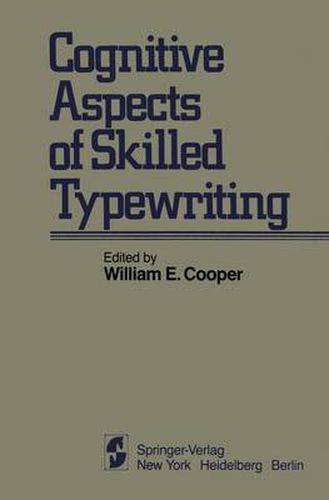Readings Newsletter
Become a Readings Member to make your shopping experience even easier.
Sign in or sign up for free!
You’re not far away from qualifying for FREE standard shipping within Australia
You’ve qualified for FREE standard shipping within Australia
The cart is loading…






This title is printed to order. This book may have been self-published. If so, we cannot guarantee the quality of the content. In the main most books will have gone through the editing process however some may not. We therefore suggest that you be aware of this before ordering this book. If in doubt check either the author or publisher’s details as we are unable to accept any returns unless they are faulty. Please contact us if you have any questions.
This volume marks the 75th anniversary of the publication of William Book’s 1908 The Psychology of Skill, in which typewriting received its first large-scale treatment from a psychological standpoint. As Book realized early on, this form of human behavior is particularly well suited to testing psychological theories of complex motor skill and its acquisition, present ing as it does a task that richly engages cognitive and motor components of programming, yet involves a form of response output that can be readily quantified. Now that typewriting is practiced so widely in workday circumstances, studying this activity offers the additional prospect of practical applicability. Until recently, relatively few studies had been conducted on the psychology of typewriting. One might speculate that this dearth of interest stemmed in part from the fact that researchers themselves rarely undertook the activity, delegating it instead to the secretarial pool. Psychological research on piano playing has produced a literature more sizable than the one on typewriting, yet the latter activity has probably been practiced for many more total human hours in this century. But contemporary developments in word processing technology have moved the typewriter into the researcher’s office, and in recent years interest in accompanying psychological issues has grown.
$9.00 standard shipping within Australia
FREE standard shipping within Australia for orders over $100.00
Express & International shipping calculated at checkout
This title is printed to order. This book may have been self-published. If so, we cannot guarantee the quality of the content. In the main most books will have gone through the editing process however some may not. We therefore suggest that you be aware of this before ordering this book. If in doubt check either the author or publisher’s details as we are unable to accept any returns unless they are faulty. Please contact us if you have any questions.
This volume marks the 75th anniversary of the publication of William Book’s 1908 The Psychology of Skill, in which typewriting received its first large-scale treatment from a psychological standpoint. As Book realized early on, this form of human behavior is particularly well suited to testing psychological theories of complex motor skill and its acquisition, present ing as it does a task that richly engages cognitive and motor components of programming, yet involves a form of response output that can be readily quantified. Now that typewriting is practiced so widely in workday circumstances, studying this activity offers the additional prospect of practical applicability. Until recently, relatively few studies had been conducted on the psychology of typewriting. One might speculate that this dearth of interest stemmed in part from the fact that researchers themselves rarely undertook the activity, delegating it instead to the secretarial pool. Psychological research on piano playing has produced a literature more sizable than the one on typewriting, yet the latter activity has probably been practiced for many more total human hours in this century. But contemporary developments in word processing technology have moved the typewriter into the researcher’s office, and in recent years interest in accompanying psychological issues has grown.